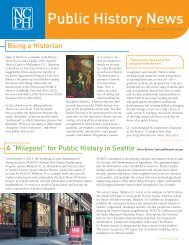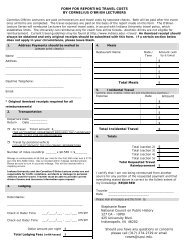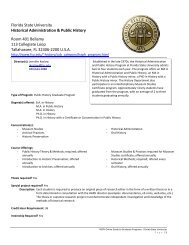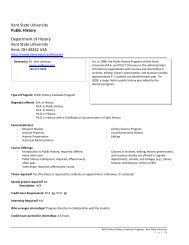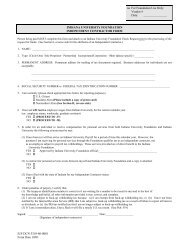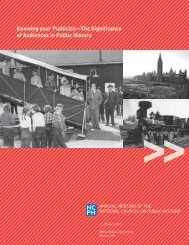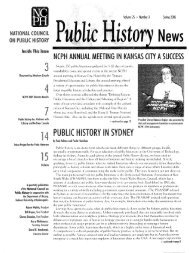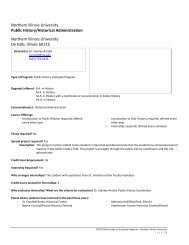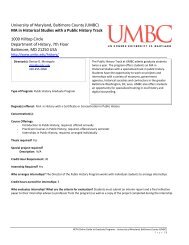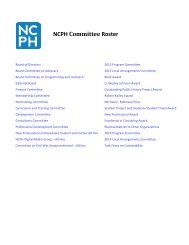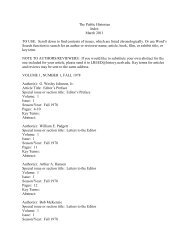Case Statement - National Council on Public History
Case Statement - National Council on Public History
Case Statement - National Council on Public History
You also want an ePaper? Increase the reach of your titles
YUMPU automatically turns print PDFs into web optimized ePapers that Google loves.
Ella Howard, Assistant Professor of <strong>History</strong><br />
Armstr<strong>on</strong>g Atlantic State University, Savannah, Georgia<br />
I work at a teaching-focused university, and am quite interested in finding ways to incorporate digital<br />
history projects at all levels of instructi<strong>on</strong>. My public history background comes from my (old-fashi<strong>on</strong>ed<br />
in many ways) M.A. in the <strong>History</strong> of the Decorative Arts, training in Material Culture, and work <strong>on</strong><br />
museum exhibiti<strong>on</strong>s. My university offers an M.A. with a c<strong>on</strong>centrati<strong>on</strong> in <strong>Public</strong> <strong>History</strong>, which gives me<br />
the chance to teach an undergraduate/graduate course in American Material Culture. I have also taught<br />
Introducti<strong>on</strong> to <strong>Public</strong> <strong>History</strong>, and Topics in Urban <strong>History</strong>—I am now working <strong>on</strong> integrating digital<br />
humanities projects into these courses.<br />
My current large project is a website <strong>on</strong> local history that I am developing with our campus website<br />
administrators and the university library archivist. I have been able to secure an undergraduate student<br />
research assistant to work with me <strong>on</strong> this project, and funding to acquire rudimentary oral history<br />
recording equipment and a digital camera. My goal is to have students in various courses produce web<br />
c<strong>on</strong>tent featuring the highlights of their research into the history of Savannah. I began this project last<br />
term with students in a first-year seminar, having them work in groups to study a figure from the history<br />
of the university, draft a short narrative, and record the audio for use <strong>on</strong>line.<br />
I am becoming interested in questi<strong>on</strong>s of sourcing, citati<strong>on</strong>, and legitimizati<strong>on</strong> as I work with students <strong>on</strong><br />
these projects. For some projects, I have assigned a “traditi<strong>on</strong>al” footnoted research paper as well as a<br />
distinct, separately c<strong>on</strong>ceived digital versi<strong>on</strong> of the project, in order to ensure that both my students<br />
and my colleagues understand that these types of assignments are just as rigorous and scholarly as any<br />
others.<br />
Another challenge that I feel str<strong>on</strong>gly is that of budget, especially in these tough times for American<br />
public universities. In designing projects, I must be mindful not <strong>on</strong>ly of the limited resources available to<br />
my students, but also the parameters of my own work. For my current website project, I have partnered<br />
with my university’s web design team, in order to try to utilize existing infrastructure and staff<br />
knowledge. This obviously entails compromise—they will have a great deal of say in how the site is<br />
designed and what it c<strong>on</strong>tains. (I proposed using Omeka, and they declined, citing it as a security risk to<br />
our university system.) I am taking this cautious approach because I have seen similar initiatives at this<br />
university (and others) aband<strong>on</strong>ed when funds are no l<strong>on</strong>ger available. As a result, I am trying to<br />
develop projects that can survive without funding and thrive when it is available.<br />
My university has been focusing a great deal <strong>on</strong> informati<strong>on</strong> literacy, in an effort to guide our students in<br />
becoming wiser and more discerning c<strong>on</strong>sumers of knowledge. I am hopeful that working with them in<br />
the producti<strong>on</strong> of digital c<strong>on</strong>tent may have the added benefit of heightening their awareness of the<br />
c<strong>on</strong>structed nature of not just digital material, but all material, whether published or unpublished.<br />
Watching groups of first-year students, especially, as they debate which facts to include or omit from a<br />
narrative is very heartening.<br />
At the other end of the teaching spectrum, <strong>on</strong>e of our advanced graduate students was able to attend<br />
the Southern Foodways Alliance Oral <strong>History</strong> Workshop last year, and has begun a series of oral history



